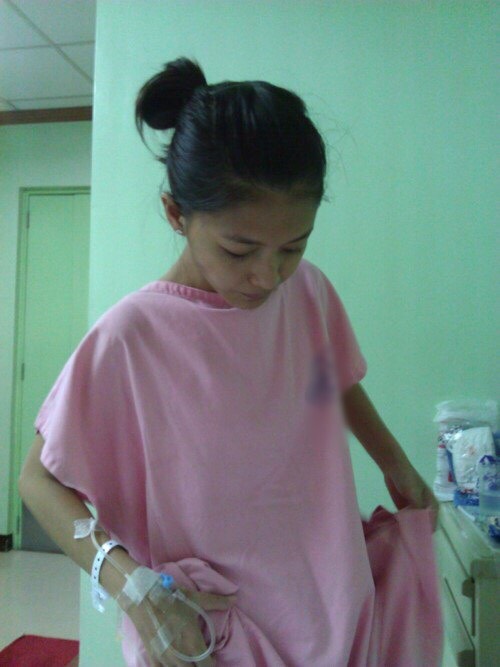
I am Ma. Cristina Brigaste, a registered nurse, and a DR-TB survivor.
Years ago, I had nothing in mind but to pursue my profession as a nurse and become successful. However, most of my time was spent as a hospital volunteer where there was no compensation. To state the reality, being a nurse meant not having enough time to eat, sleep and rest. It also meant being on duty without the necessary safety equipment for protection, which inevitably makes us at risk of contracting infectious diseases.
In the year 2011, after a month of productive cough, back pains, night sweats, dyspnea on exertion, body weakness, and decreased appetite, I was diagnosed with Tuberculosis. I underwent and completed the usual treatment of 6 months for category 1 TB, where I had to take three big reddish pills every day that were indeed, very difficult to swallow.
Three months after my treatment for category 1 TB, signs and symptoms started to manifest again. Due to the persistence of the signs and symptoms, I had to gather all my strength to have myself checked. The doctor told me that it could be TB again, and worse, it might be drug-resistant tuberculosis. True enough, it was Drug-resistant TB, a clinically diagnosed case. I must say that it was the worst day of my life and I was totally devastated. I was even in denial; it was very hard for me to accept that I had to face a very difficult task of going through long-term treatment.


I thought my life was all planned out but the disease caused me major life turns. Before DRTB, I was serving my patients well as I was gaining experience, and eventually, I could already work abroad to provide for my family. But because of this dreaded disease, not only that I had to resign from my dream job; my life goals were shattered, and that made me lose my morale and self-esteem. I also had to resign from my work because of the fear of not being able to regain physical health and of being the topic of conversations amongst colleagues.
In spite of the extreme fear and shame brought about by my condition, I tried my very best to help myself and consulted the PMDT treatment center and started my DRTB treatment.
I had the treatment for 19 months, took 12-14 pills a day, endured the pain at the injection sites every day for 6 long months, and faced different side effects such as severe vomiting, electrolyte imbalance, allergy, difficulty in hearing due to kanamycin injection, ringing of ears and many more. I was even hospitalized for 3 weeks due to these adverse drug reactions.
“Let us work hand in hand to spark a sense of hope that the future of TB patients and their families will get better as the battle continues.”
ma.Cristina Brigaste
I also had uncertainties concerning my career because of my TB history. I dreaded not being employed or being asked again by an employer to sign a waiver stating that they have no liability for whatever happens to me. I felt hopeless. It was as if completing the treatment was still not an assurance that life will go back to normal. What will happen to me after suffering from the illness and the long-term treatment?
In summary, the whole DRTB experience seemed to be an uphill climb, a great and insurmountable ordeal for a then young professional like me.
Looking back, I know that I would have not been able to survive everything without the help of so many people. Of course God and my family come first to mind. They provided all the help and support I needed. Next are my co-patients who shared with me the joys and pains of going through treatment. The experiences we shared together provided strength and further inspiration to continue on and to never give up. I also owe a lot to my very kind and generous doctors who were with me every step of the way and the tireless PMDT treatment center staff who assisted me and who were strict and brutally frank most of the time, but still never failed to provide a sense of hope for all of us. And of course, my co-patients who became friends and part of my strong support system.
By joining different patient organizations such as TBPeople Philippines Organization Inc., I can be of help to TB patients in need, my way of giving back the support I received during my treatment. I believe that at times, our own light goes out and is only rekindled by a spark from another person, and that’s what TBP does: lighting the world of those who are already losing hope because of tuberculosis.

Truly, my experience of being a DRTB patient made me realize the importance of compassionate care and patient-centered treatment, as well as the power of committed and trustworthy health care professionals who love their work beyond financial gains. On the other side of treatment, I now better understand why patients struggle in taking the pills daily; aside from the fact that the pills are really big and hard to swallow, one also struggles from the emotional burden of facing stigma and discrimination from people. The experience of becoming a patient myself taught me to be more patient and understanding towards other patients.
DRTB treatment does not only require new treatment regimen, enablers, free medicines, and diagnostic tests. It entails the intangibles: full dedication, compassion, respect, understanding, and support of the health workers for the TB patients from the time of screening until one completes the treatment, as well as the support from the co-patients.
As a DRTB survivor who completed the treatment successfully, I always keep in mind that every day is an opportunity to provide much-needed strength and hope. Choose to be truly present in the lives of people with tuberculosis in their lowest and trying times. Grab the chance to help people in need.
At present, I am now fully recovered and working as a training specialist under the training unit of the National TB Control Program who capacitates health workers proving TB services.
I know that there is still so much to be done. Let us work hand in hand to spark a sense of hope that the future of TB patients and their families will get better as the battle continues.




